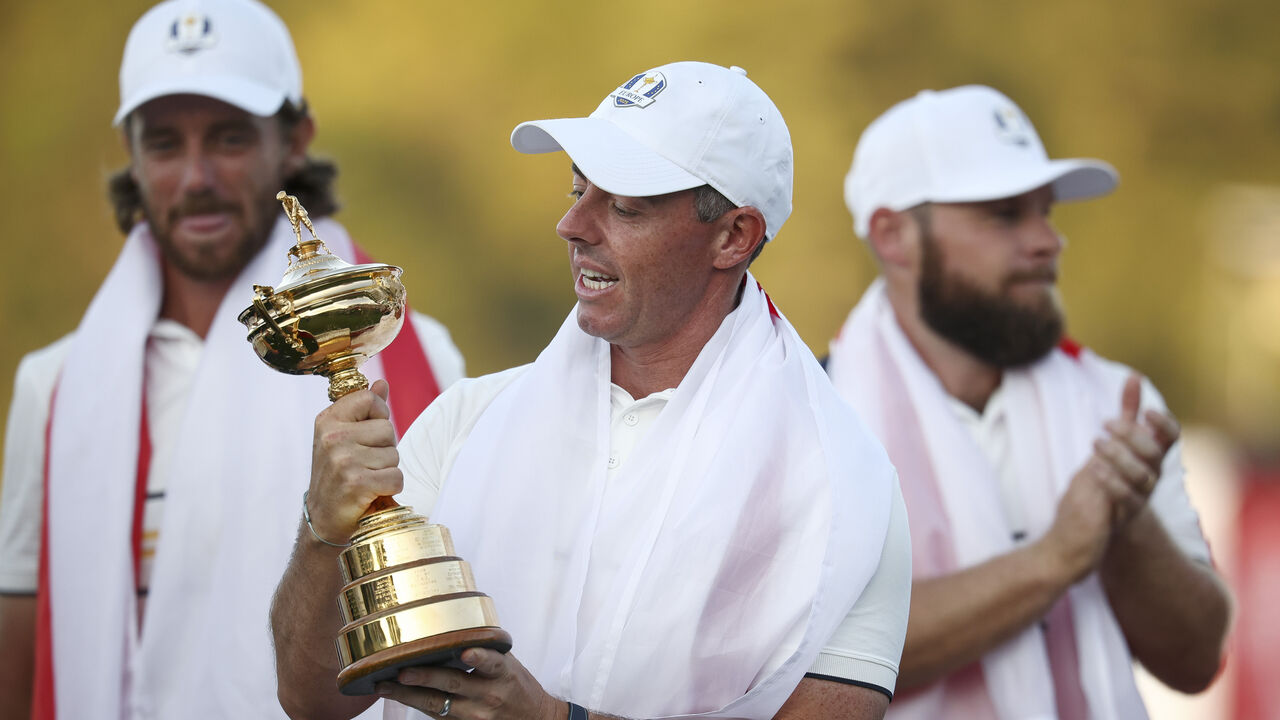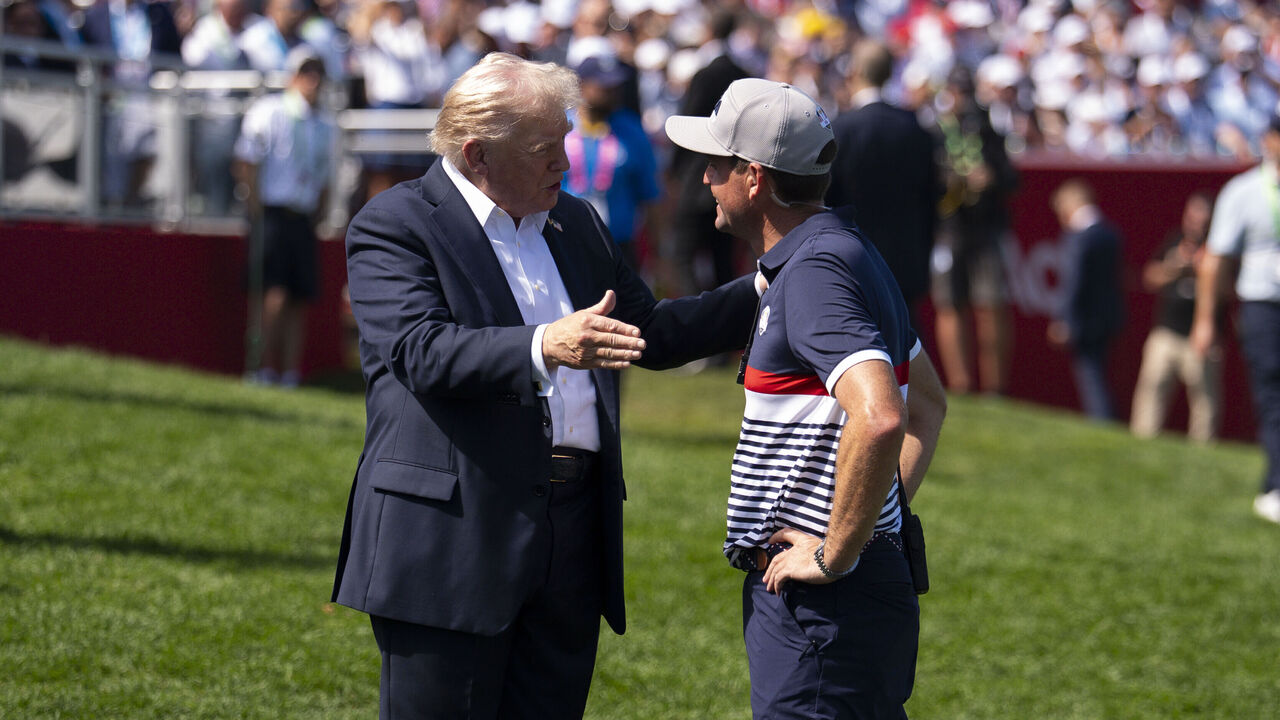Rowdy Ryder Cup: Unruly U.S. fans turned golf into a gong show
Earlier this summer, my playing partner and I were paired with a couple of guys in their 20s for a round of golf.
They were friendly enough, if not particularly good at keeping their balls out of the trees, but they had an unusual golf tic: They talked all the time. Before shots and during shots; as people were about to bring the club back or forward; while people were pausing and waiting for them to stop talking.
It was evident they were completely oblivious to the whole be-quiet-during-golf concept.
Naturally, I thought of those fellas as the Ryder Cup devolved into a sort of professional wrestling chaos at Bethpage Black over the weekend - first as Team Europe stormed out to an insurmountable lead, and then as the Americans tried and failed to complete an incredible comeback. The Europeans were subjected to all kinds of verbal abuse from American fans: shouts, profanity, some beverages as projectiles. The noise continued even as European players were trying to hit shots, causing some American golfers to appeal for calm. It was a decidedly odd scene for, you know, a golf tournament.
Rory McIlroy, normally one of the more beloved players in the game, took the brunt of the outrage - alongside, most bizarrely, his wife, Erica. The reigning Masters champion said spectator behavior crossed many lines, calling it "unacceptable and abusive." Tom Watson, the American legend and former Ryder Cup captain, apologized for the shouts and taunting by his fellow countrymen and said he was "ashamed" by the display.

Is this the new normal for the Ryder Cup - replacing a typically respectful golf audience with something more often seen at, say, Auburn-Alabama or a UFC fight? Was it a strange one-off produced by the specific combination of a European blowout over the first two days, a raucous New York crowd, and the heightened tensions that resulted? Or is this the kind of thing we can expect during international sporting events in the coming years, as the presidency of Donald Trump metaphorically pokes its fingers in the eyes of its allies and leans into an us-against-the-world ethos?
On the first question, it's worth going back to the chatty young guys with whom I golfed in the summer. They're from a generation that hasn't necessarily paid much attention to regular tournament golf in the post-Tiger years, and they're more likely to know the sport from viral clips of things like the Phoenix Open, where fans get loud and crazy from the moment the gates open. If those are the kind of fans who are packing the stands at a Ryder Cup - the kind of guys who never really learned about the golf clap - then it's no wonder that things got a little, or a lot, out of hand.
And things really did go sideways quickly at Bethpage. When the home team was trounced in the opening session Thursday and the three-team sessions that followed, it was perhaps inevitable that a crowd of New Yorkers would become unruly. The atmosphere at Arthur Ashe Stadium for tennis' US Open - another sport that expects the paying audience to shut it while the action is taking place - often becomes overly boisterous, leaving the chair umpire to plead with the crowd to pipe down already.
But there's also no denying that sport in the era of Trump's second term has become politically charged. Whether it's the U.S. national anthem being booed in Canadian arenas amid 51st-state talk, or the fact that a "U-S-A! U-S-A!" chant has taken on a new edge as ICE agents seek to round up, detain, and eventually expel foreigners, these once-friendly competitions have become a little less friendly.

It's to the Europeans' great credit that they came out the other side of all the unpleasantness at Bethpage as victors. Non-golf fans might find it a little precious that golfers expect quiet considering that other sports encourage home spectators to get loud to distract and confuse a visiting team. However, it's ridiculous to expect someone like McIlroy to simply tune out profane jeers as he's standing over a putt when he doesn't have to deal with that during the other 51 weeks of the competitive year.
What does this mean for the Ryder Cup in the future? Probably nothing. The event moves to Ireland in 2027, where the audience is much more likely to simply be enthusiastic in support of McIlroy, Shane Lowry, and their teammates than it is to be abusive toward the American players. The next Ryder Cup on U.S. soil won't take place until 2029, when Trump will (presumably) no longer be president. It's also scheduled to be hosted at Hazeltine in Minnesota - not exactly a place that's notorious for unruly fan behavior.
But that U.S. team might be captained by Tiger Woods, who caused some controversy in his youth as his enthusiastic on-course demeanor - shouts, fist bumps, the odd bit of profanity - sometimes rubbed opponents the wrong way. Might Captain Tiger try to channel some of that Bethpage-style chaos into helping his team?
If nothing else, it would put his friendship with McIlroy to the test.
Scott Stinson is a contributing writer for theScore.
HEADLINES
- Europe holds off Sunday charge from U.S. to win 2nd straight Ryder Cup
- Ryder Cup forecaddie: Analysis from Day 3 at Bethpage
- Rory calls out 'unacceptable and abusive behavior' from fans at Bethpage
- Ryder Cup in European hands no matter where they play
- European players want Donald back as Ryder Cup captain